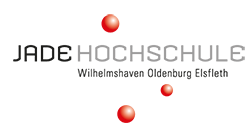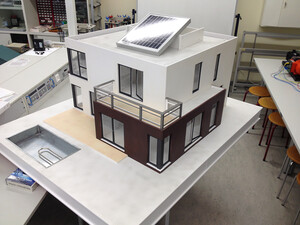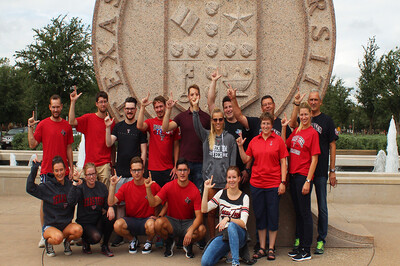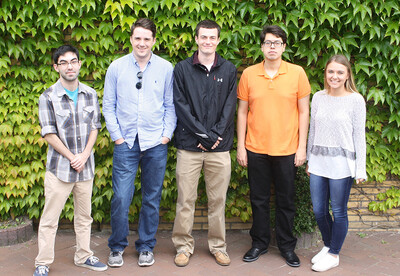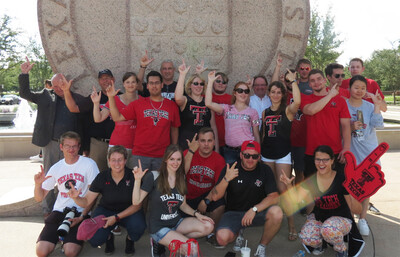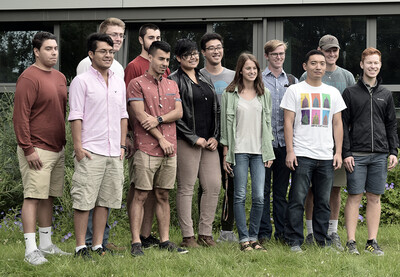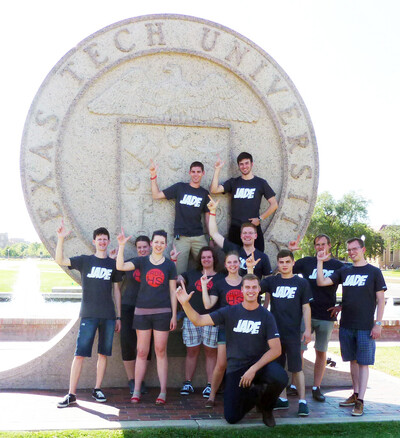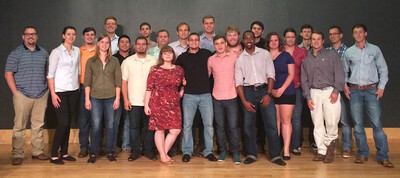2018 Excursion Project 3
5th excursion to TTU - Project "smart house model automation"
Participants:
- Prof. Dr. Josef Timmerberg FB-MIT
- Prof. Dr. Heiner Köster FB-I
- Dipl.-Ing. Paul Beckmann FB-MIT
- Dipl.-Ing. Nicole Sabrina Jesse FB-I
- Dipl.-Ing. Volker Lübben FB-I
- Regine Zink-Zimmerer B.A. FB-I
- 8 German students FB-I
- 8 German students FB-MIT
- Dr. Michael G. Giesselmann Professor and Chair Dep. of Electrical and Computer Engineering
- Allison Wright Program Manager, International Programs Oversees Europe
Meetings
- George E. Spoth Executive Associate Dean - International Programs
- Zaida Gracia Assistant Academic Dean for International Programs
- Bethany Kuwitzky, Senior Study Abroad Advisor, Office of International Affairs
2018 Project 3
Organization: Department of Engineering Sciences and Department of Management, Information, Technology
Dipl.-Ing. Volker Lübben
Dipl.-Ing. Paul Beckmann
Regine Zink-Zimmerer B.A.
Project "smart house model automation"
Participants:
- Prof. Dr. Josef Timmerberg FB-MIT
- Prof. Dr. Heiner Köster FB-I
- Prof. Dr. Folker Renken FB-I
- Dipl.-Ing. Paul Beckmann FB-MIT
- Dipl.-Ing. Nicole Sabrina Jesse FB-I
- Dipl.-Ing. Udo Schürmann FB-I
- 8 German students FB-I
- 8 German students FB-MIT
- 6 American students
- Dr. Michael G. Giesselmann Professor and Chair Dep. of Electrical and Computer Engineering
2016 Excursion Project 2
4th excursion to TTU
Organization: Department of Engineering Sciences and Department of Management, Information, Technology
Participants:
- Prof. Dr. Josef Timmerberg FB-MIT
- Prof. Dr. Heiner Köster FB-I
- Dipl.-Ing. Paul Beckmann FB-MIT
- Dipl.-Ing. Nicole Sabrina Jesse FB-I
- Dipl.-Ing. Volker Lübben FB-I
- 10 German students FB-I
- 6 German students FB-MIT
- Dr. Michael G. Giesselmann Professor and Chair Dep. of Electrical and Computer Engineering
Project "smart house model automation"
Meetings
- James Yang, Ph.D.
- Hong-Chao Zhang, Ph.D.
- Allison Wright Program Manager, International Programs Oversees Europe
- Brandon Weeks, Ph.D., Associate Dean of Research and Graduate Programs
- George E. Spoth Executive Associate Dean - International Programs
- Zaida Gracia Assistant Academic Dean for International Programs
- Bethany Kuwitzky, Senior Study Abroad Advisor, Office of International Affairs
- Richard Gale, Ph.D., P.E. Professor Elektrical and Computer Engineering
- Victoria Coverstone, Ph.D., Associate Dean for Undergraduate Studies
- Al Sacco Jr., Ph.D. Dean Edward E. Whitacre Jr. College of Engineering
- Audra N. Morse, Ph.D., P.E. Associate Dean for Undergraduate Studies and Professor
- Stephen Ekwaro‐Osire, Ph.D. Associate Dean of Research and Graduate Programs, Professor
2016 Project 2
Organization: Department of Engineering Sciences and Department of Management, Information, Technology
Dipl.-Ing. Volker Lübben
Dipl.-Ing. Paul Beckmann
Project "smart house model automation"
Participants:
- Prof. Dr. Josef Timmerberg FB-MIT
- Prof. Dr. Heiner Köster FB-I
- Prof. Dr. Folker Renken FB-I
- Dipl.-Ing. Paul Beckmann FB-MIT
- Dipl.-Ing. Nicole Sabrina Jesse FB-I
- Dipl.-Ing. Udo Schürmann FB-I
- 10 German students FB-I
- 6 German students FB-MIT
- 12 American students
- Dr. Michael G. Giesselmann Professor and Chair Dep. of Electrical and Computer Engineering
2014 Excursion Project 1
3rd excursion to TTU
Organization: Department of Engineering Sciences
Participants:
- Prof. Dr. Heiner Köster FB-I
- Dipl.-Ing. Paul Beckmann FB-MIT
- Dipl.-Ing. Volker Lübben FB-I
- 12 German students
Topics and meetings:
- Project "Wind Energy"
Meetings:
- Michael Johnson, International Agreements Administrator Office of International Affairs
- Audra N. Morse, Ph.D., P.E. Associate Dean for Undergraduate Studies and Professor
- Stephen Ekwaro‐Osire, Ph.D. Associate Dean of Research and Graduate Programs, Professor
- Andy Swift, Sc.D. Associate Director, Education, National Wind Institute
- Matt Saldana Instructor of Wind Energy, National Wind Institute
- Kacey Young Advisor, Wind Energy, National Wind Institute
- Richard Gale, Ph.D., P.E. Professor Elektrical and Computer Engineering
2014 Project 1
Organization: Department of Engineering Sciences
Dipl.-Ing. Volker Lübben
Dipl.-Ing. Paul Beckmann
Project "Wind Energy"
Participants:
- Prof. Dr. Heiner Köster FB-I
- Dipl.-Ing. Paul Beckmann FB-MIT
- Dipl.-Ing. Volker Lübben FB-I
- 12 German students
- 12 American students
- Andy Swift, Sc.D. Associate Director, Education, National Wind Institute
- Matt Saldana Instructor of Wind Energy, National Wind Institute
- Kacey Young Advisor, Wind Energy, National Wind Institute
The project starts in March / April and ends in September 2020.
Approx. 16 students from Texas Tech University and 16 students from Jade University work together in the project. After the preparation period from March to June, the mixed German-American group continues the work together in the project in July / August for 6 weeks at the Jade Hochschule. Following the preparatory theory and conception of the project, they are working on sub-projects using the example of a smart house model in international groups of 3-6 students, in which they plan, implement, program and document specific tasks.
The scale of the house is 1:10. The house has two floors, a pool and is equipped with a variety of technology.
Since the students have different previous knowledge, lectures will take place during the first 2 weeks prior to the start in order to get a common starting point. It makes sense to have previous knowledge of courses such as:
- Fundamentals of electrical engineering and electronics, electrical circuits
- Basics of data processing and programming
- Basics of control engineering
In weeks 3 to 6, the students define the project plan, define work packages and then work on the practical part of the project with the associated documentation.
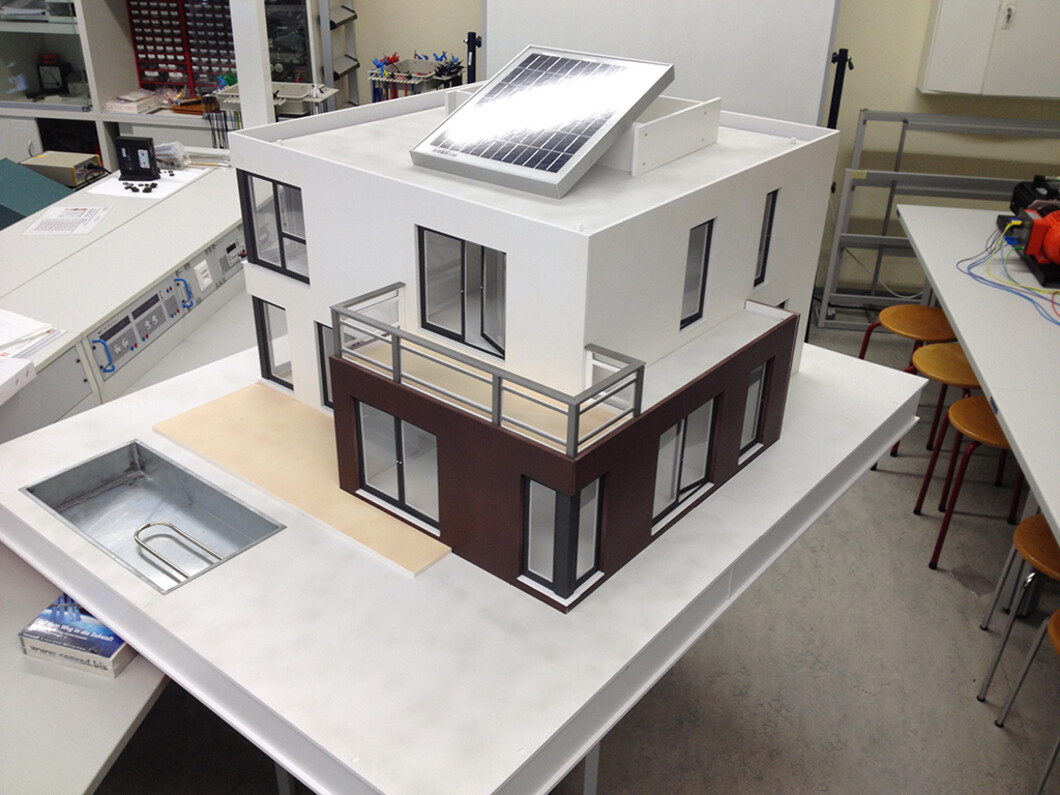
Staff:
Dipl.-Ing. Paul Beckmann
Department of Management, Information Technology - organization, lectures, laboratory support
Jan Dierks B.Eng.
Department of Engineering Sciences, laboratory support
Prof. Dr.-Ing. Heiner Köster
Department of Engineering Sciences - organization
Dipl.-Ing. Jörg Meyer
Department of Engineering Sciences - simulations
Harald Musa M.Eng.
Department of Engineering Sciences - lectures, exercises
Prof. Dr. Folker Renken
Department of Engineering Sciences - lecture
Prof. Dr. Josef Timmerberg
Department of Management, Information Technology - organization, lectures, laboratory support
Detailed subprojects description.
Group A - Heating Pool
Control the water temperature in the outdoor pool. Different power controllers and controller strategies are to be tested. For state‐of‐the‐art controls, operation should also be possible via mobile phone.
Plan of procedures:
subgroup 1:
- measure the step function response of the control process (without the module of subgroup 2)
- build the mathematical model from the step function response
- simulate (Scilab, Xcos) the control process with the mathematical model
subgroup 2:
- analyse an existing phase controlled modulator for the pool heating
- simulate the circuit with LT‐Spice
- test the existing hardware
- analyse an pulse packet controller for the pool heating
- simulate the circuit with LT‐Spice
- test the existing hardware
Both
- control unit design (with the math. model and the frequency response characteristic)
- simulation of the overall system
- programming the controller with Arduino
- measure the step function response of the overall system and make the presentation and a movie
- create the mathematical model with physical knowledge and compare it with that of measurement
- calculate the frequency response characteristic from the step function response
- simulate (Scilab, Xcos) the control process with the mathematical model and the frequency response characteristic
- create the presentation and documentation and make a movie
Group B: App Development
Combine all values gathered by other groups via MQTT in an Unity Application. This Application should also be capable of sending values to other groups.
Plan of procedures:
- Draw a possible interface consisting of User Interface components (2D)
- Develop possible scenes, keep them as generic as possible
- Research a suitable MQTT Library
subgroup 1:
- Build interface for 2 other groups (Elevator and Object Detection / Movement)
- ask them for possible in‐ and outputs
- Add word recognition
subgroup 2:
- Build interface for 2 other groups (Pool Heating and Photovoltaic)
- ask them for possible in‐ and outputs
- Build an interface which is able to display developments over time
Both
- split source code in reusable functions
- document source code
- document use cases and program in one (or more) Flowcharts
- create the presentation and documentation and make a movie
Group C: Elevator
Control the external elevator attached to the house.
Plan of procedures:
- Research on different elevator dispatch mechanism
- Summarize possible sequences
- Control the motor using an Arduino
- Use Sensors to locate the elevator
- Add security features
- Broadcast values via MQTT
- Add buttons and displays
- document source code
- document use cases and program in one (or more) Flowcharts
- create the presentation and documentation and make a movie
Group D: Photovoltaics
Supply the house with renewable energy by a PV system. The renewable energy system should consist of the solar module, an accumulator and a controller, which also contains an mpp‐tracker. For state‐of‐the‐art controls, operation should also be possible via mobile phone.
Plan of procedures:
- plan the energy supply of the house model – energy independent / grid independent
- create an energy supply with "normal" components: PV panel, battery, ..
- measure the characteristic curves I(U) and P(U) of the PV panels
- dimension the battery
- create a concept of a mpp‐controller
subgroup 1:
- analyse the existing control hardware and the existing mpp tracker with LT‐Spice and test it
subgroup 2:
- develop the software for the Arduino
- test the software with the simulation of the PV‐panel
Both
- join the hardware and the software
- test the whole system, draw characteristic curves
- create the presentation and documentation and make a movie
Group E: Optical Movement and Shape Recognition
Signal, if a special car as ambulance or fire truck enters the estate of the house. For state‐of‐the‐art controls, operation should also be possible via mobile phone.
Group E1: Signal, if any person or animal is in the garden or at the entry door, if nobody is at home.
Group E2: Signal, if a special car as ambulance or fire truck enters the estate of the house.
For state‐of‐the‐art controls, operation should also be possible via mobile phone.
Plan of procedures
- configure a Raspberry Pi 3 including a camera
- getting started with Python
- analyse the data from of camera (picture format, compression, origin, ...)
- adjust the resolution by your own procedure and find the optimal value
- practise image processing: colour reduction to grey/b‐w
- practise image processing: rotate, translate, mirror, scale, edge detection (if time)
- handle the effect of changing the intensity of illumination ‐ offset reduction
- if necessary: filter methods
subgroup 1 Optical Movement Recognition:
- empirical approach
- correlation approach
- difference method
subgroup 2 Optical Shape Recognition:
- practise picture segmentation = thresholding
- edge and corner detection such as Canny Edge Detection, Moravec’s Corner Detector
- AND/OR edge and corner detection such as Sobel Edge Detection, Harris Corner Detector
- Hough‐Transformation for a straight line
Both
- compare and discuss your results of both groups
- document used methods and program
- create the presentation and documentation and make a movie
The German-American project concludes with an excursion to the USA. Only those who participate in the project, can participate in the excursion. Without participation in the excursion, the German-American project can not be completed successfully.
Requirements:
- Good to very good English skills
- Takeover of a personal contribution for the trip in the amount of 500, - Euro
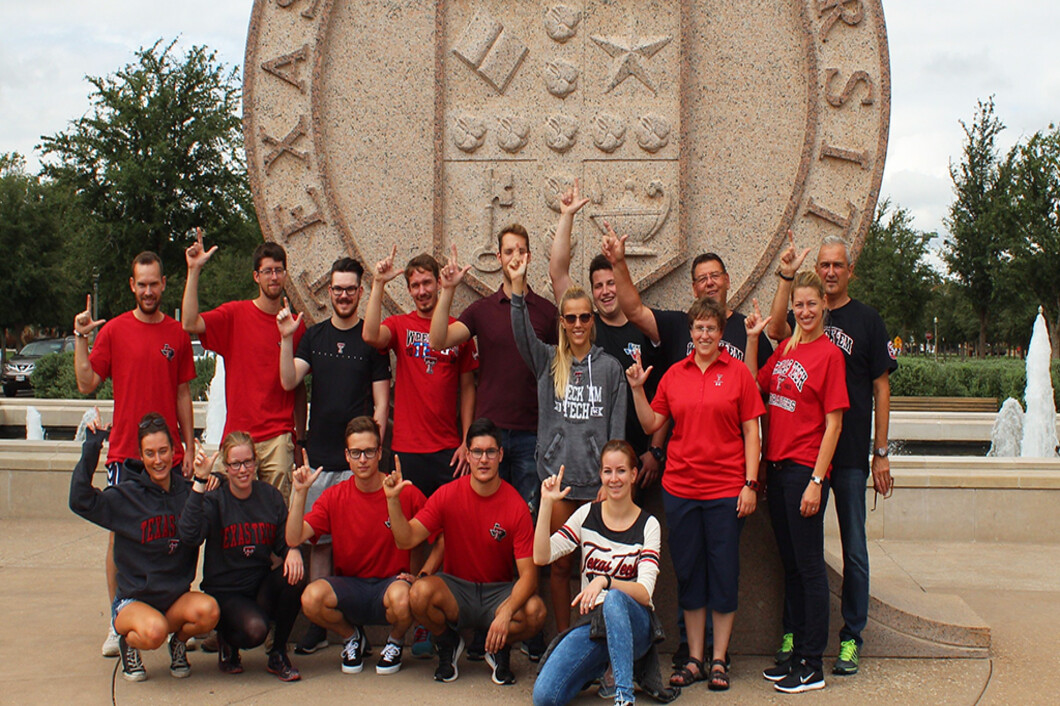
The excursion also serves to know the partner university better, in order to make an easier decision for a later study there.
Company visits (Lubbock, Dallas, New York) and visits of cultural facilities and events during the excursion round off the international project experience with expanded knowledge of international project development and the get to know of the USA.
A final English-language excursion report is jointly prepared by the students and made available to the president of the Jade Hochschule. The excursion report will be published on the website of the Jade Hochschule in an appropriate form.
Download content syllabus 3 cts TTU theoretischer Teil 1 smart home project (300kB)
Download content syllabus 3 cts TTU praktischer Teil 2 smart home project (300kB)
Download of the english pdf-presentation project (6MB)
Download of the english Powerpoint-presentation projekt (28MB)
Contact and application
Bachelor students of the Jade University of Applied Sciences who
- wish to participate in a project in a group together with American students
- wish to train their intercultural competences
- are studying Electrical Engineering, Communication and Information Technology, Mechanical Engineering, Computer Sciences in Mechanical Engineering, Mechatronics, Medical Technology, Marine Technology, Industrial Engineering or Business computing in at least their 3rd semester
may apply for participation. The information sessions will take place in December 2019 and March 2020. You can always contact the contact person below for questions. In special Moodle courses information about the project and the excursion will be provided later.
Kontakt:
Department of Engineering Sciences
Department of Management, Information, Technology
====== ONLY FOR TTU STUDENTS ======
TTU COE students apply in the college!
contact COE:
Allison Wright
Program Manager, International Programs Oversees Europe
====== ONLY FOR GERMAN STUDENTS ======
If you wish to participate, you can apply AFTER the information events for participation:
- Online application - NOT OPEN!
Required are: personal data with motivation letter and excerpt from the grade card
After application deadline:
- Sighting and evaluation of applications.
- Communication about participation.
- If necessary, waiting list.
- Query subprojects for group formation
.
